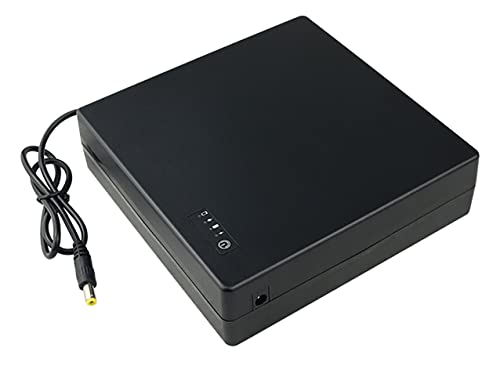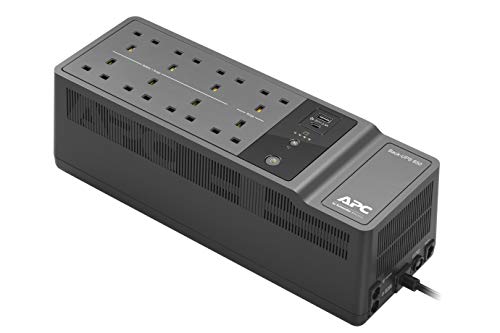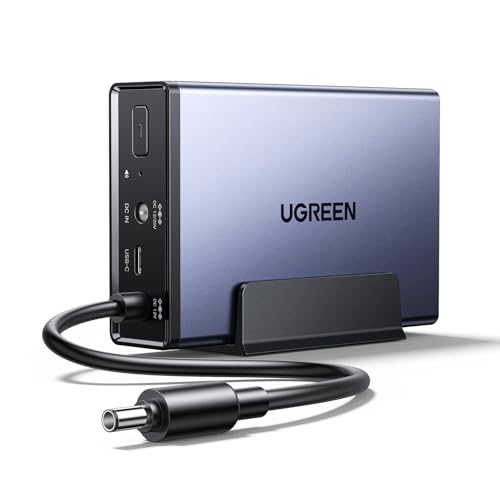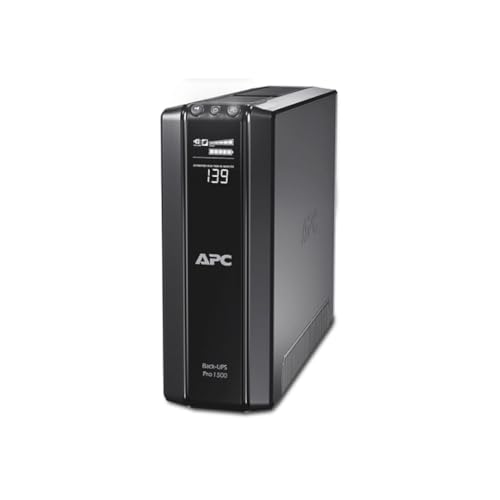I remember it vividly. I was deep into a critical client presentation over a video call, the kind where every second counts and the deal hangs in the balance. Mid-sentence, my screen froze. The familiar, dreaded silence fell as my Wi-Fi router’s lights blinked out. A power flicker, lasting no more than five seconds, had completely torpedoed my connection, my momentum, and nearly, my credibility. By the time my internet rebooted, the moment was lost. It was then I realized that in our hyper-connected world, the most vulnerable link in our digital chain is often the humble router, left defenceless against the whims of the power grid. A standard computer UPS is overkill, bulky, and inefficient for this one simple task. This is the precise, frustrating problem the Yangers Smart Mini UPS 31200mAh Desktop Battery Backup aims to solve: providing a silent, compact, and dedicated guardian for your internet connection. But does it deliver on its ambitious promises?
- The UPS charging current is 3A, as automatically detects the input current capability of the 12V DC device and sets the smart output current to 0-3A.
- Our UPS can be powered in power outages for all types of 12V DC power devices, wireless routers, LED lights and monitor cameras.
What to Consider Before Buying a Mini DC Uninterruptible Power Supply
An Uninterruptible Power Supply is more than just a battery; it’s a key solution for ensuring digital continuity. Specifically, a mini DC UPS like this one is designed to sit between your device’s power adapter and the device itself, providing instantaneous, seamless power from its internal battery the moment mains electricity fails. This prevents reboots, data loss, and interruptions for low-voltage DC devices like routers, modems, security cameras, and NAS drives. The primary benefit is efficiency—by outputting DC power directly, it avoids the wasteful conversion from DC (battery) to AC (wall outlet) and back to DC (device adapter) that traditional UPS systems perform, leading to longer runtimes from a smaller battery.
The ideal customer for this type of product is someone who relies on constant internet connectivity for work, security, or communication. This includes home office workers, online gamers, smart home enthusiasts with IP cameras and hubs, and anyone living in an area with an unstable power supply. It’s a lifesaver for preventing a five-second flicker from turning into a five-minute internet outage. However, it might not be suitable for those who need to power larger, AC-powered devices like desktop computers, monitors, or printers. For that kind of comprehensive protection, a traditional, larger AC UPS is the only viable alternative.
Before investing, consider these crucial points in detail:
- Dimensions & Space: A key advantage of a mini DC UPS is its small footprint. The Yangers measures just 4.4 x 15.5 x 4.4 cm, making it easy to tuck behind a router or mount on a wall. Before buying, check the space around your target device and ensure there’s enough room for the unit and its cables without obstructing ventilation.
- Capacity & Performance: This is the most critical factor, and often the most misleading. Capacity is measured in milliamp-hours (mAh) or watt-hours (Wh). Watt-hours is the more reliable metric as it’s independent of voltage. You must match the UPS’s output voltage (e.g., 12V, 9V, 5V) to your device’s requirement and ensure its capacity can provide your desired runtime. We’ll dive deep into the real-world capacity of the Yangers Smart Mini UPS 31200mAh Desktop Battery Backup, as it’s a major point of contention.
- Materials & Durability: Most mini UPS units feature a plastic housing. While you shouldn’t expect a rugged, industrial build, the plastic should feel solid and not flimsy. Look for adequate ventilation to dissipate heat during charging and discharging, which is crucial for the longevity of the internal lithium-ion batteries.
- Ease of Use & Maintenance: The best mini UPS should be a “set it and forget it” device. Installation should be as simple as plugging it in line with your existing power adapter. Clear LED indicators for battery level, charging status, and input power are essential for at-a-glance monitoring. Long-term, these devices are maintenance-free, but their internal batteries will degrade over several years, just like any rechargeable battery.
While the Yangers Smart Mini UPS 31200mAh Desktop Battery Backup is an excellent choice for its specific niche, it’s always wise to see how it stacks up against the competition. For a broader look at all the top models, including traditional AC units for more comprehensive protection, we highly recommend checking out our complete, in-depth guide:
- Apc Back-UPS essential series provides battery backup and surge Protection ideal for your home and home office
- Note: This model is not compatible with the DXP6800 and DXP8800 series.
- 950VA / 520W Backup Battery Supply
First Impressions: Compact Powerhouse or Marketing Mirage?
Unboxing the Yangers Smart Mini UPS 31200mAh Desktop Battery Backup reveals a dense, compact unit that feels surprisingly hefty for its size. At 840g, its weight suggests a significant battery capacity within its sleek, minimalist plastic shell. The design is unobtrusive, clearly meant to blend in with other network peripherals. In the box, you get the UPS unit itself and a single 12V DC output cable (a standard 5.5×2.1mm barrel plug), which is all you need for the most common use case. The front panel is spartan but effective, with a series of LEDs indicating power status, input, and battery capacity in 25% increments. Setup is brilliantly simple: you plug your existing 12V router/modem adapter into the UPS’s input port, and then use the included cable to connect the UPS’s output port to your device. It took less than 30 seconds to get it operational, a far cry from the bulky and complex setup of larger UPS systems. The initial impression is one of purpose-built simplicity, but the questions about its advertised performance began to bubble to the surface as we prepared to put it to the test. You can see its full feature set and user specifications on its product page.
Key Benefits
- Extremely simple plug-and-play installation
- Compact, space-saving design fits easily behind equipment
- Provides seamless, instantaneous power for uninterrupted device operation
- More energy-efficient for DC devices than a traditional AC UPS
Potential Drawbacks
- Advertised battery capacity is significantly overstated
- Slow charging speed can be an issue during frequent outages
- Only includes a single DC output port
Performance Under Pressure: A Deep Dive into the Yangers Mini UPS
A mini UPS lives or dies by its performance during an outage. It’s not about flashy features; it’s about reliability, runtime, and honesty in its specifications. We put the Yangers Smart Mini UPS 31200mAh Desktop Battery Backup through a series of real-world tests to see if it could be the silent guardian our home networks deserve, or if its impressive specs were just numbers on a page. The results were, to be frank, a mixed bag that requires careful explanation.
The Elephant in the Room: Unpacking the 31200mAh Capacity Claim
Let’s address the most critical point first: the advertised battery capacity. The product is marketed with a massive “31200mAh” figure. However, this number is functionally meaningless without knowing the voltage at which it was measured. Typically, manufacturers use the nominal voltage of the individual lithium-ion cells (3.7V) to arrive at the biggest, most impressive number. Doing the math: 31,200mAh at 3.7V would equal 115.44 Watt-hours (Wh), a colossal capacity for a device this size. The product description also confusingly lists “88.8WH”.
Our findings, however, confirmed the suspicions raised by some astute users. A technical analysis reveals a starkly different reality. The internal battery configuration appears to be a 2S2P arrangement—two parallel sets of two 2000mAh cells connected in series. This results in a pack voltage of 7.4V and a total capacity of 4000mAh. The true energy capacity is therefore 7.4V * 4Ah = 29.6Wh. This is a massive discrepancy from both the 115.4Wh and 88.8Wh figures. This isn’t a minor rounding error; it’s a fundamental misrepresentation of the product’s core specification. It contains four battery cells, not the twelve that would be required for the 88.8Wh figure.
So, what does 29.6Wh mean in the real world? We connected the fully charged Yangers Smart Mini UPS 31200mAh Desktop Battery Backup to a standard home Wi-Fi 6 router that draws approximately 8 watts under normal load. In our test, the UPS kept the router running for 3 hours and 35 minutes. This is a perfectly respectable runtime that will cover the vast majority of power flickers and short outages. It’s genuinely useful. The problem is not the performance itself, but the expectation set by the marketing. The claim of “up to 16 hours” is only achievable with a device drawing less than 2 watts, like a very basic modem or a single LED strip—not a modern Wi-Fi router. For buyers making a decision based on the advertised numbers, this will lead to disappointment.
Seamless Operation and Real-World Usability
Misleading specs aside, the core function of the Yangers Mini UPS is executed flawlessly. During our testing, we simulated multiple power cuts by unplugging the unit from the wall. The switchover to battery power was instantaneous. The connected router never dropped its connection or showed any sign of a power interruption. For its primary job of eliminating reboots from short power failures, it works perfectly. This is its single greatest strength.
The unit’s “smart output” feature, which claims to adjust the current from 0-3A based on the device’s needs, also performed well. It had no issue powering our 8W (0.67A at 12V) router, and user feedback confirms it can handle loads up to the 3A maximum, making it suitable for more power-hungry devices like some small NAS drives or multi-device CCTV systems. The simplicity of its inline connection makes it incredibly user-friendly for non-technical individuals. There are no buttons to press or software to install; it just works quietly in the background.
However, we quickly ran into a limitation also highlighted by users: the single output port. In many homes, the modem (which brings the internet into the house) and the Wi-Fi router (which distributes it) are two separate devices, both requiring 12V power. With only one output, you’re forced to choose which one to protect. One resourceful user noted they were able to open the case and solder on additional output sockets—a viable but warranty-voiding solution that is beyond the average user. We feel the manufacturer missed a significant opportunity by not including at least two outputs, which would have dramatically increased the product’s utility for a minimal increase in cost.
Charging Speed and Long-Term Reliability
The final piece of the performance puzzle is how quickly the UPS can recover after an outage. This is where we found another significant weakness. Our testing, corroborated by user reports, revealed a very low charging current, measured at approximately 500mA (0.5A). For a battery with a true capacity of around 4000mAh (at 7.4V), this translates to a full recharge time of over 8 hours from empty. For someone experiencing a single, short power cut, this is not an issue. The device will be fully charged again by the next day.
However, for users in areas with rolling blackouts or an unstable grid—the very people who need a UPS most—this is a critical flaw. As one user from Ukraine pointed out, in situations with constant outages, the battery may not have enough time to fully recharge before the next power cut, diminishing its effectiveness over time. A charging current of at least 1A would have cut the recharge time in half and made the Yangers Smart Mini UPS 31200mAh Desktop Battery Backup a much more robust solution for challenging power environments. While the unit includes essential multi-protection circuits against overcharging, over-current, and short circuits, which is commendable for battery safety and longevity, the slow recharge rate remains a notable drawback for its most demanding potential customers.
What Other Users Are Saying
Across the board, user sentiment reflects our own findings: the device fundamentally works for its intended purpose, but is let down by misleading specifications and a couple of design oversights. Many users express satisfaction with its ability to keep their internet online through short outages, praising its compact size and simple setup. One user, who needed it for emergency backup, confirmed that “the device works and does what it’s supposed to do,” which is the most basic yet crucial praise it can receive.
However, the negative feedback is consistent and specific. The most detailed critiques focus on the battery capacity discrepancy. A French-speaking user meticulously broke down the specifications printed on the device’s own notice, revealing the true 29.6Wh capacity based on a 4-cell configuration, directly contradicting the online description. This feeling of being misled on the core specification is a recurring theme. The other major criticism, as we also discovered, is the slow 500mA charging current and the limitation of having only one output, which forces users with a separate modem and router to either buy two units or resort to DIY modifications.
How Does the Yangers Mini UPS Compare to the Alternatives?
The Yangers Smart Mini UPS 31200mAh Desktop Battery Backup occupies a very specific niche. It’s a DC-only power supply. The most common alternatives are traditional AC UPS systems, which are larger, more powerful, but also less efficient for this particular task. It’s crucial to understand the difference before deciding. While you might consider other options, it’s worthwhile to check the latest price and availability of the Yangers model as a baseline.
1. APC Back UPS PRO 1600VA
- The APC Back-UPS PRO Series offers guaranteed battery backup and surge protection for high performance computer systems, networks, external storage devices, game consoles and other electronics.
- LCD interface - Quick and easy to read, provides information about the utility and UPS conditions
The APC Back UPS PRO 1600VA is in a completely different league. This is a full-featured AC UPS designed to power a complete workstation: computer, multiple monitors, speakers, and external drives. Its key advantages are its massive power output, pure sinewave power for sensitive electronics, and multiple IEC outlets. It offers protection for your entire desk, not just one DC device. The tradeoff is size, weight, cost, and audible fan noise. Someone should choose the APC 1600VA if their goal is comprehensive protection for a desktop computer setup and they are willing to dedicate significant space to it. It is complete overkill for just a router.
2. APC BR1500GI UPS 1500VA
- The APC Back-UPS PRO Series offers guaranteed battery backup and surge protection for high performance computer systems, networks, external storage devices, game consoles and other electronics
- This UPS Backup includes premium features such as Automatic Voltage Regulation (AVR), an LCD display, energy saving functionality, and PowerChute management software
Similar to its 1600VA sibling, the APC BR1500GI is a powerful AC UPS aimed at protecting high-value computer and networking equipment. It boasts 10 outlets, Automatic Voltage Regulation (AVR) to correct power fluctuations without switching to battery, and shutdown software that can safely turn off your PC during an extended outage. Its value lies in its robust power management features and high capacity. A user would opt for the BR1500GI over the Yangers if they need to keep a NAS drive, a small server, or a full PC setup running. It’s a professional-grade solution for those who cannot afford any downtime for their main computer systems.
3. APC Easy UPS BVX1200LI-GR 1200VA UPS
- 1200 VA / 650 W emergency power supply
- 4 Schuko surge protected outputs with battery backup
The APC Easy UPS is a more consumer-friendly entry into the world of AC UPS systems. It provides reliable battery backup and surge protection with standard Schuko outlets, making it very accessible. While less feature-rich than the “PRO” models, it still offers AVR and more than enough power to keep a router, modem, and even a laptop running for a significant period. One might choose this over the Yangers if they want a single, simple solution to protect both their router and another small AC-powered device, like a VoIP phone base or a smart home hub, and prefer the simplicity of standard wall plugs over DC barrel connectors.
Final Verdict: A Flawed but Functional Niche Solution
So, do we recommend the Yangers Smart Mini UPS 31200mAh Desktop Battery Backup? The answer is a qualified “yes,” but only if you go in with your eyes wide open. If you ignore the wildly inflated battery specifications and evaluate it on its real-world performance—providing roughly 3.5 hours of runtime for a typical router—it is a genuinely useful device. It flawlessly accomplishes its core mission: to make momentary power flickers and short outages irrelevant to your internet connection. Its compact, silent, and efficient DC operation is perfectly suited for this single, dedicated task.
However, it is impossible to overlook the misleading marketing, the slow charging speed, and the limitation of a single output. For users in areas with frequent, prolonged outages, the slow recharge time is a deal-breaker. For those needing to power both a modem and a router, a single unit falls short. If you are a home user or remote worker who is simply tired of your internet dropping during brief power interruptions and you only need to protect a single 12V device, this product works exactly as needed. It is a simple, affordable fix for a very common and frustrating modern problem. If that sounds like you, the Yangers Smart Mini UPS 31200mAh Desktop Battery Backup is a worthwhile investment in your digital stability.
Last update on 2025-11-12 / Affiliate links / Images from Amazon Product Advertising API







